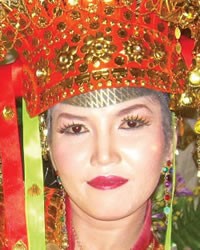Serawai in Indonesia

Photo Source:
Copyrighted © 2026
Anonymous All rights reserved. Used with permission |
Send Joshua Project a map of this people group.
|
| People Name: | Serawai |
| Country: | Indonesia |
| 10/40 Window: | Yes |
| Population: | 346,000 |
| World Population: | 346,000 |
| Primary Language: | Malay, Central |
| Primary Religion: | Islam |
| Christian Adherents: | 3.00 % |
| Evangelicals: | 0.63 % |
| Scripture: | New Testament |
| Ministry Resources: | Yes |
| Jesus Film: | Yes |
| Audio Recordings: | Yes |
| People Cluster: | Pasemah of Sumatra |
| Affinity Bloc: | Malay Peoples |
| Progress Level: |
|
Introduction / History
The Serawai are a Malay group who live mostly in the South Bengkulu and Seluma regencies. They live in the Seluma, Pino, Talo and Manna districts. Serawai people also live in the city of Bengkulu and other cities in Bengkulu province. Typically, Serawai call themselves Orang Selatan (People of the South), even though there are Kaur and Besemah people in this southern section of the province as well. The Serawai have their own language, which consists of the Talo and Manna dialects.
What Are Their Lives Like?
The rural Serawai live in wooden houses raised on stilts which have thatched roofs made from leaves. The space below the house is used for storage or for keeping livestock. Villages are generally compact groups of homes situated along a roadside or riverbank. On the upper part of the front of a house, there are often sun-shaped drawings symbolizing the light of Allah. Traditionally, a Serawai person's home may not be directly across from the house of a sibling. Ancestral lines are drawn from both sides of the family. Determining where a couple lives after marriage depends on a formal agreement (kulo) between the couple and their families. The majority of Serawai make a living as rice farmers. To irrigate their rice fields, they depend on rain or a nearby river. The Serawai are also known as coffee farmers. They often go to other areas to start coffee plantations or become workers on a coffee farm. Other crops include cloves, pepper, brown sugar, coconut, rattan, rubber, fruits and vegetables. Recently, many Serawai have migrated to North Bengkulu to look for wider fields with better irrigation. When crops fail, they try farming in a different area of the province. Serawai villages that focus on fish farming have recently experienced rapid growth. Many Serawai people also work as traders, civil servants, teachers, members of the military, construction workers and day laborers. The Serawai area is not very affluent, in fact their lives may be considered economically difficult or depressed. Despite that, the area is considered very safe with low crime levels.
What Are Their Beliefs?
The vast majority of Serawai people are Muslims, but their day-to-day lives are influenced by older beliefs. They fear ma'sumai, a ferocious tiger that can assume human form, first attracting and then slaying its victims. They also perform ceremonies connected to farming. Before planting, seeds are washed in the mendundang ceremony. Newly harvested rice stalks are bound together during the nuruni ceremony. These are performed to show that the rice plants are properly respected, so that the spirit of the rice plants will not leave their fields, thus preventing crop failure. At certain times, farmers offer goats at the graves of their ancestors or holy places. A small percentage of the Serawai are Christian. There are around three generations of Christians so there are some whose grandparents were Christian. They are spread throughout a few areas and have formed Serawai churches.
What Are Their Needs?
Some Serawai, especially the youth, are shifting from Christianity to embrace non-Christian religions. This is especially happening because of marriages between those of different religions. According to accounts, the reduction in the total number of Christians is very significant. A special effort to reach youth as well as the elderly is very much needed to deal with this situation. The Serawai farmers also need better irrigation systems, so they are not wholly dependent on the rain.
Prayer Points
Pray for the Lord to thrust out loving workers to the Serawai people.
Pray for the Lord to use dreams and visions to get the attention of the Serawai people.
Pray for disciples to make more disciples in Serawai villages.